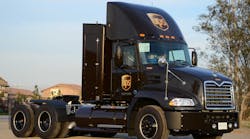United Parcel Service (UPS) is beefing up its “green vehicle” acquisition targets as part of its 2016 Corporate Sustainability Report; efforts aimed at reducing the company’s absolute global greenhouse gas (GHG) emissions from its ground operations some 12% percent by 2025.
David Abney, chairman and CEO of UPS, noted in a statement that by 2020 one in four new vehicles purchased annually by Big Brown will be an alternative fuel or advanced technology vehicle, up from 16% in 2016.
The company also set a new goal that, by 2025, 40% of all the ground fuel will be from sources other than conventional gasoline and diesel, an increase from 19.6% in 2016.
UPS noted that it already operates more than 8,300 alternative fuel and advanced technology vehicles worldwide, which includes electric, hybrid electric, hydraulic hybrid, compressed natural gas (CNG), liquefied natural gas (LNG), propane, and lightweight fuel-saving composite body vehicles.
Big Brown added that it also uses millions of gallons of lower-carbon footprint renewable diesel and renewable natural gas (RNG) in its fleet each year.
Those savings come despite growth in e-commerce deliveries, which UPS said is driving up energy usage at its facilities and for powering its vehicle fleet.
Since 2009, UPS noted that it has invested more than $750 million in alternative fuel and advanced technology vehicles and fueling stations globally, while using more than 97 million gallons of alternative and lower-carbon fuels in its ground fleet in 2016.
The company added that it uses a “Rolling Laboratory” approach to determine which alternative fuels and technologies work best in each situation.



